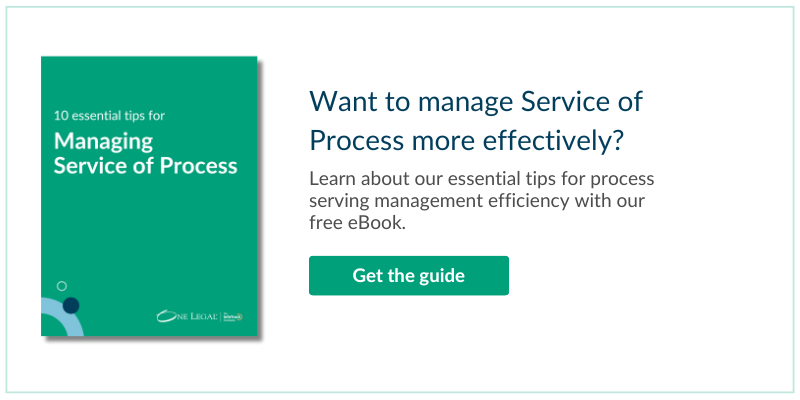Substitute service of process in California refers to the legal method of serving court documents on a party involved in a lawsuit when the standard methods of personal service are not successful.
Process serving is an essential part of the legal system, ensuring that all parties receive proper notice and an opportunity to respond to legal actions brought against them.
Substitute service of process in California
In California, substitute service is governed by the California Code of Civil Procedure, specifically Sections 415.20 through 415.95.
What is substitute service of process?
Substitute service of process in California is a method used to serve legal documents on a party who is involved in a legal proceeding but is difficult to locate or intentionally avoiding service.
In California law, substitute service of process allows for documents to be delivered to a responsible adult who is not the party being served, but who resides or works at the same location.
- Attempted personal service: Initially, the process server will attempt to personally serve the documents to the individual named in the legal action. If the person is not available or cannot be reached after reasonable attempts, the process server may try alternative methods.
- Substitute service: If personal service is not possible, the process server may leave the documents with another adult who is residing or employed at the individual’s residence or place of business.
- Detailed documentation: After leaving the documents with the substitute server, the process server must fill out an affidavit of due diligence. This affidavit details the attempts made to serve the documents personally and explains why substitute service was necessary.
- Mailing of documents: After substitute service, a copy of the documents must be mailed to the individual’s address. This ensures that the individual is officially notified of the legal proceedings.
- Proof of service: The process server must file proof of service with the court to confirm that the documents were served properly. The proof of service provides evidence that the individual was notified of the legal action against them.
How to serve someone who is avoiding service in California
If someone is avoiding service, there are legal steps you can take to ensure proper service. Let’s go into them briefly.
- Diligent search: Make sure you have made reasonable efforts to locate the individual to be served. This may involve checking public records, contacting known associates, or using a professional investigator.
- Substituted service: If you cannot directly serve the individual, you may be able to serve another responsible person who is at least 18 years old and who resides at the individual’s residence or place of business. You must also follow specific procedures to document the substituted service.
- Service by mail: In certain cases, you may be able to serve documents by mail, but this generally requires the recipient’s cooperation.
- Service by publication: If you cannot locate the individual through diligent search, you may be able to request permission from the court to serve them by publishing a notice in a newspaper.
- Seek legal advice: If you’re having difficulty serving someone, it’s wise to consult with an attorney who can provide guidance on the appropriate steps to take based on your specific situation.
Continue reading for a more detailed understanding of the entire process for substitute service of process in California.
Here’s what to know:
Standard personal service attempt
Standard personal service attempt is the primary method used to serve court documents on a party involved in a legal proceeding. A registered process server or law enforcement officer is authorized to perform this task.
They identify the defendant and deliver the court documents directly to them in person.
This can occur at the defendant’s residence, place of business, or any location where they can be found. If the defendant accepts the documents willingly, the server completes an “Affidavit of Service” or “Proof of Service” form, detailing the date, time, location, and the name of the person served.
The document is signed under penalty of perjury to affirm that service was completed correctly.
Process servers often make multiple attempts at different times and on different days to increase the chances of locating the defendant.
However, if the defendant cannot be found after exhaustive efforts or intentionally avoids service, the server may seek court permission to use substitute service or other authorized methods.
Proper service of process is vital to ensure that all parties receive notice of legal actions taken against them, granting them the opportunity to respond and defend their rights in court. Failure to serve the documents correctly can lead to delays or case dismissal.
Different jurisdictions have specific rules and regulations concerning service of process.
If involved in a legal matter, consulting with an attorney is advisable to ensure adherence to all legal requirements for service, avoiding potential complications in the case.
Unsuccessful personal service
Unsuccessful personal service occurs when attempts to serve court documents on a party in a legal proceeding through the standard method of personal delivery are not successful.
The process server or law enforcement officer, despite making diligent efforts, cannot physically deliver the papers to the intended recipient (the defendant). This may happen if the defendant is not present at their usual location, actively evades service, or if there is insufficient information about their whereabouts.
In some cases, the defendant may refuse to accept the documents, or the location might have restricted access, making it difficult for the server to reach them. In rare cases, the server themselves can be at fault.
When personal service attempts are unsuccessful, the process server typically makes multiple diligent attempts on different days and times before considering alternative methods, such as substitute service or service by publication.
Proper documentation of these efforts is essential to seek court approval for alternative service methods.
It is crucial for the process server to adhere to all legal requirements and regulations when attempting personal service and, if necessary, seek court approval for alternative methods to ensure that the defendant is properly served with the court documents.
Declaration of diligent search
A Declaration of Diligent Search is a formal document filed by the party attempting to serve court documents on a defendant when standard personal service attempts have been unsuccessful.
It provides a detailed account of the efforts made to locate and serve the defendant personally. The declaration typically includes information such as dates, times, and locations where the process server or law enforcement officer tried to serve the documents.
The purpose of the Declaration of Diligent Search is to demonstrate to the court that the party seeking service has made a genuine and diligent effort to locate the defendant and serve them with the necessary papers.
It serves as evidence that all reasonable steps were taken to comply with the legal requirement of providing notice to the defendant about the legal proceedings against them.
Once the court reviews and accepts the Declaration of Diligent Search as satisfactory, it may authorize alternative methods of service, such as substitute service or service by publication, to ensure that the defendant receives the court documents and has the opportunity to respond to the legal action.
Acceptable substitute service methods
In California, acceptable substitute service methods are authorized alternative ways to serve court documents on a defendant when standard personal service attempts have been unsuccessful.
These methods are allowed under specific circumstances and are intended to ensure that the defendant receives notice of the legal proceedings. Some of the acceptable substitute service methods in California include:
- Substitute service on a competent adult: Leaving the documents with a competent adult (18 years or older) at the defendant’s residence, place of business, or usual mailing address. After leaving the documents, the process server must also mail a copy of the documents to the defendant at the same address where they were left.
- Service on a person in charge: If the defendant’s place of business is the target of service, the documents can be given to a person in charge at that location, along with mailing a copy to the defendant at the business address.
- Agent for service of process: If the defendant has appointed an agent for service of process and registered that information with the California Secretary of State, the documents can be served to the appointed agent.
- Service by certified mail: Mailing the court documents via certified mail with a return receipt requested to the defendant’s last known address. This method requires a separate mailing of a copy of the documents to the defendant’s address. Service of summons in this manner is deemed complete on the 10th day after posting and mailing.
It is essential to follow all legal procedures and requirements when using substitute service methods to ensure that the defendant’s due process rights are protected.
A “Proof of Service” must be filed with the court after substitute service is completed, providing evidence that the documents were properly delivered to the defendant. The court will review this proof to determine the validity of the substitute service.
Proof of Service
After the substitute service is completed, the server must file a proof of service with the court, detailing the method used and providing evidence that the documents were delivered to the defendant.
This document is essential to show that the defendant was properly served, and it allows the court to proceed with the case.
It’s crucial to follow all legal procedures for service of process accurately, as improper service can lead to delays or even dismissal of the case.
Conclusion
Substitute service of process plays a crucial role in the process of litigation, ensuring that all parties involved in a lawsuit receive proper notice of legal actions against them.
When standard personal service attempts are unsuccessful, substitute service methods provide an alternative means to serve court documents on the defendant.
In California, these methods include leaving the documents with a competent adult at the defendant’s residence or place of business, service on an agent for service of process, or mailing the documents via certified mail to the defendant’s last known address.
The use of substitute service is contingent upon the filing of a declaration of diligent search, demonstrating the earnest efforts made to locate and serve the defendant personally.
Proper documentation and adherence to legal procedures are paramount to ensure the validity of the substitute service.








